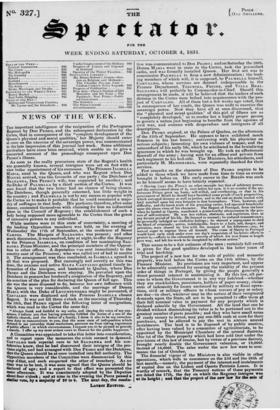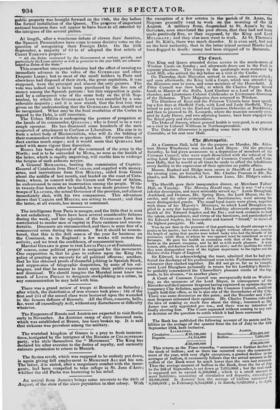NEWS OF THE WEEK.
THE important intelligence of the resignation of the Portuguese Regency by Don PEDRO, and the subsequent declaration by the Cortes, that in consequence of the "complete development of the Queen's physical and moral qualities," her Majesty should enter at once on the exercise of the sovereign power, was communicated in the late impression of this journal last week. Some additional particulars have since been received, which enable us to give a connected account of the proceedings consequent upon Don PEDRO'S illness.
As soon as the really precarious state of the Regent's health was generally known, several intrigues were set on foot with a view tothe appointment of his successor. The Princess ISABELLA MARIA, aunt to the Queen, and who was Regent when Don MIGUEL arrived, was the favourite of one party • the Dutchess of BRAGANZ A, Don PEDRO'S wife, was supported 'by another ; and the Duke of PALMELLA by a third section of the Cortes. It was soon found that the two latter had no chance of being chosen. The Dutchess, though generally esteemed, has little weight in the country ; and PALMELLA is not by any means so popular with the Cortes as to make it probable that he could command a majo- rity of suffrages in that body. His partisans therefore, after some demur, contented themselves with claiming for him an influential place in the Council of Regency: the establishment of such a body being supposed more agreeable to the Cortes than the grant of extensive powers to any individual.
While matters were in this state of uncertainty, a meeting of the leading Opposition members was held, on the evening of' Wednesday the 17th of September, at the residence of Senor CAMPOS. The Marquis of SALDANHA was present; and after much discussion, it was resolved, late at night, to offer the Regency to the Princess ISABELLA, on condition of her nominatingSAL- DANHA Prime Minister, and the principal members of the Opposi- tion to other offices. A deputation was sent immediately to the country-seat of the Princess; who was called out of bed to receive it. The arrangement was then concluded, as ISABELLA agreed to all that was proposed. But cunningly and secretly as this was done, the anxious and active SILVA CARVAL110 gained timely in- formation of the intrigue, and hastened to Queluz, where Don Psnao and the Dutchess were staying. He prevailed upon the Dutchess to procure her husband's resignation of the Regency, and his sanction of the plan for declaring the Queen of full age. This she was the more disposed to do, because her own influence with the Queen is very considerable, and the marriage of Donna MARIA with the Duke of LEUCHTENBERG might be prevented, if CARVALHO were displaced and the Princess Is sneeee chosen Regent. It was not till three o'clock on the morning of Thursday the 18th, that PEDRO signed the following letter of resignation, which was read to the Codes the same day.
"Always frank and faithful to my oaths, and obeying the voice of my con. science, I inform you that having yesterday fulfilled the duties of a son of the Catholic church, and the father of a family, I deem it also to be my conscien- fious duty to communicate to you, that the same state of indisposition which dictated to me yeKerday those resolutions, prevents me from taking cognizance of public affairs: in which circumstances, I request you to be pleased to provide
&remedy. I offer up my most ardent vows to Heaven for the public happiness." A Committee was appointed to take this letter into consideration, and to report upon the measures the crisis seemed to demand.
CARVALHO took especial care to let SALDANHA and his con- federates know, that he had discovered their intrigue of the pre- vious night, and had arranged with Don PEDRO and the Dutchess,
that the Queen should be at once installed into full authority. The Opposition members of the Committee were disconcerted by this coup detat, and each suspected the other of treachery. As no time was to be lost, it was soon agreed that the Queen should be declared of age; and a report to that effect was presented the same afternoon. It was unanimously adopted by the Deputies about four o'clock ; and at nine in the evening the Peers passed a skaglar vote, by a majority of 20 to 6. The ;text day, the resolu-
lion was communicated to Don PEDRO ; andon Saturday the 20th, Donna MARIA went in state to the Cortes, took the prescribed oaths, and was formally installed Queen. Her first act was to commission PALMELLA to form a new Administration ; the lead- ing members of which will, it is supposed, be PALMELLA himself, CARVALHO, whose services are deemed indispensable in the Finance Department, TERCEIRA, FRFIRE, and VILLA REAL. SALDANHA will probably be Commander-in-Chief. Should this arrangement be made, it will be believed thlt the leaders of each division in the Cortes were bribed into acquiescence with the pro- ject of CARVALHO. All of them but a few weeks ago voted, that in consequence of her youth, the Queen was unfit to exercise the sovereign power. Now they have all at once discovered, that the " physical and moral qualities" of this girl of fifteen are so " completely developed," as to render her a highly proper person to govern a nation just beginning to breathe from tile agonies of civil war, and overrun with desperadoes and intriguers of all descriptions. Don PEDRO expired, at the Palace of Queluz, on the afternoon of the 24th of September. He appears to have exhibited much firmness in his last hours; conversing with his physician on serious subjects; lamenting his own violence of temper. and the misconduct of his early life, which he attributed to the brutalizing ignorance in which he was brought up. He took an affectionate farewell of the army ; having sent for an officer and private front each regiment to his bed-side. The Ministers, his attendants, and particularly M. MENDIZABAL, were repeatedly thanked for their services.
Few remarks on the character of Don PEDRO require to be added to those which we have made from time to time as events brought it before us. His early career in the Brazils was such as he himself seems to have bitterly repented..
" Having (says the Tinics) no other example but that of arbitrary power, and the unrestrained abuse of it, ever before his eyes, it is no wonder if the un- fortunate Prince grew up hasty, self-willed, and overbearing, or that in his government of Brazil he should have furnished some proofs of such propensities, which outraged decency as well as justice, and in the end no doubt reacted with fatal mischief upon his own tbrtunes in that hemisphere. Time, however, and difficulty, and the harsh trials of his preceding career, had operated beneficially upon the above vices of his character. The Regent of Portugal, from the hour when he landed at Oporto, manifested a praiseworthy advancement in the pro- cess of' self-restraint. He was less violent, obstinate, and capricious, than at any former period of his life. He listened to counsel; lie endured remonstrance; he personally indulged no vindictive feelings; he showed a repugnance to shed the blood of criminals; active, indefatigable, brave to a fault, toil, danger, and privation, were shared by him with the meanest of his followers—nay, he seemed eager to engross them all himself. The cause of liberty in Portugal would have early sunk under even one day's suspension of his heroic efforts to protect it,—efforts to the exhausting severity of which his iron frame at length gave way, and left his work to be completed by different artists."
This seems to be a fair estimate of the man ; certainly full credit is given for the good qualities developed Ill his latter years of trial and hardship.
The project of a new law for the sale of public and monastic property, was laid before the Cortes on the 19th ultimo, by the Finance Minister. Its provisions are very important, and appear to be admirably contrived for securing the stability of the present order of things in Portugal, by giving the people generally a direct personal interest in maintaining it. By this law, all per- sons to whom the Government is in any way indebted—whether they are stockholders, pensioners, holders of paper-money, claim- ants of indemnity for losses sustained by military or fiscal opera- tions, civil or military officers to whom arrears of pay or salary are due—in short, whatever may be the nature of their recognized demands upon the State, all are to be permitted b offer them at their full nominal value in payment for any property which is 'declared saleable by the Government. All the land that can be divided without diminishing its value is to be portioned out in the greatest number of parts possible ; and they who have small sums of ready money to invest, may pay one-fifth cash at once for their purchases, and be _allowed to pay the rest in sixteen annual instalments. The land is to be disposed of by public auction, after having been valued by a committee of agriculturists, to be appointed by the Municipal Chambers of the several districts. One lot of the State property which had been sold (not under the provisions of this law of course, but by virtue of a previous decree), brought nearly double the Government valuation, or 19,000/. instead of 10,000/. The sales under the new law were to com- mence the 1st of October.
The financial vigour of the Ministers is also visible in other operations, which we/e to commence on the 23d and the 26th of last month,--namely, the payment of the interest and instalments of capital due on the Lisbon and Oporto Patriotic Loans. It is worthy of remark, that the Treasury notices of these payments are dated the 17th, the day on which the Regency intrigue was at its height ; and that the project of the new law for the sale of
public property was brought forward on the 19th, the day before the formal installation of the Queen. The progress of important national business does not appear to have been at all retarded by the intrigues of the several parties.



















 Previous page
Previous page